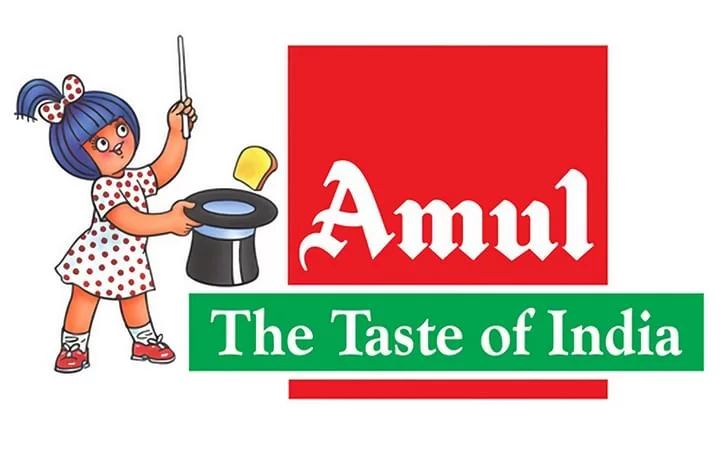Latest News on Amul
With over five decades of presence, India’s most beloved and contentious mascot has sparked numerous conversations and controversies throughout its enduring run.
The Amul Girl has become an iconic symbol in Indian advertising, representing the brand Amul and its products, particularly butter. The mascot was created in 1966 by Sylvester daCunha, the managing director of ASP, with the goal of bringing the brand to life and resonating with audiences. The character’s design, featuring a round face, big eyes, and a mischievous wink, was intended to appeal to housewives and has since become a beloved figure in Indian culture.
The Amul Girl’s first appearance on a hoarding in Mumbai in 1967 generated a phenomenal response, with onlookers captivated by her uniqueness and charm. The character’s popularity led to her becoming a staple on billboards, bus shelters, and kiosks across India, and her playful innocence contrasted sharply with the dry, corporate tone of most other ads at the time. The mascot became a stamp of trust in the brand, and people loved her, leading to Amul shifting from a boring product to a vibrant cultural icon.
Over the years, the Amul Girl has been used to comment on real-time events, politics, and social trends with clever humor. The brand has tackled various topics, from the rise of the Hare Rama Hare Krishna movement to airline strikes, making Amul a familiar and beloved voice in Indian homes. While some of the ads have sparked controversy, the team behind the Amul Girl has remained committed to pushing boundaries and making statements.
The Amul Girl has become a national treasure, with fans collecting the ads as memorabilia and others finding it an amusing way to stay up-to-date with current events. The character’s essence remains the same, even as the brand evolves, and her simple signature polka dot dress is ingrained in the memories of every Indian. The Amul Girl holds a place in the Guinness Book of World Records for being the longest-running advertising campaign in the world, and her success lies not just in the catchy slogans or clever humor but in her ability to remain relevant for decades.
Today, the Amul Girl is more than just a mascot; she is a symbol of Indian advertising and a cultural icon. Her legacy extends beyond India, and she is recognized globally as a masterclass in advertising and branding. The Amul Girl’s story is a testament to the power of creative advertising and the impact it can have on a brand’s success and cultural relevance. With her reign of over five decades, the Amul Girl continues to be the soul of the brand, and her influence can be seen in many aspects of Indian culture and advertising.
GCMMF Managing Director Jayen Mehta has been nominated to the India Brand Equity Foundation (IBEF).
Jayen Mehta, the Managing Director of Gujarat Cooperative Milk Marketing Federation, which markets the popular Indian dairy brand Amul, has been nominated to the board of the India Brand Equity Foundation (IBEF). IBEF is a foundation set up by the Department of Commerce, Ministry of Commerce and Industry, with the goal of creating international awareness for Brand India. Mehta’s appointment is a significant honor, and he has expressed his enthusiasm to contribute to the success of Brand India.
Mehta’s nomination comes at a time when Amul is making waves globally, following its international debut in the US market last year. The brand has also recently entered the European market through a partnership with Spanish cooperative COVAP. The launch was marked by a viral animated campaign featuring the iconic “utterly butterly” Amul girl, which highlighted the country’s rich taste and culture on the international stage.
As a member of the IBEF board, Mehta will join other prominent members, including Prasoon Joshi, CEO of McCann World Group India, and Puneet Chhatwal, CEO of Taj Hotels and Resorts. Mehta believes that his experience in promoting Amul as the “Taste of India” for several decades will be valuable in his new role. With Amul’s recent international launches and exports to over 50 countries, Mehta is confident that the brand has put India’s taste on the center stage globally.
Mehta also emphasized that this is the right time for Brand India and Indian brands to shine globally, acquiring soft power to withstand trade, tariff, and geo-political challenges. As the fastest-growing large economy globally, India has a unique opportunity to showcase its strengths and culture to the world. Mehta’s appointment to the IBEF board is a significant step in this direction, and he is committed to contributing to the success of Brand India. With his experience and expertise, Mehta is likely to play a key role in promoting Indian brands and culture on the global stage.
Recent Updates
No Results Found
The page you requested could not be found. Try refining your search, or use the navigation above to locate the post.
